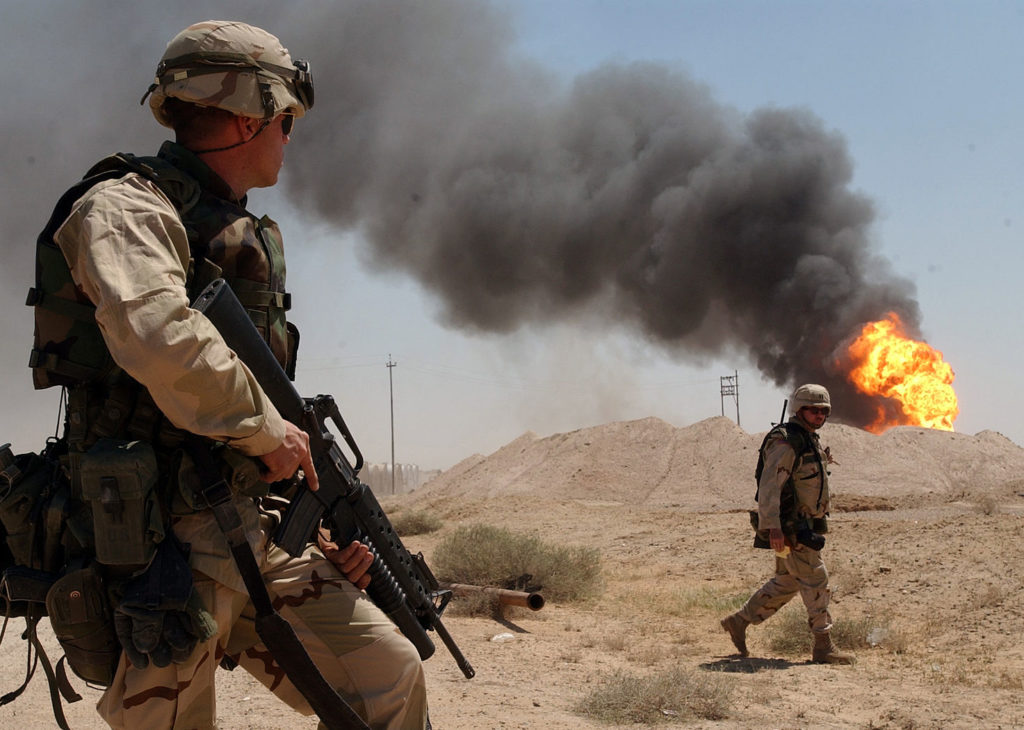In Iraq, “It’s the oil, stupid.”

 Amid all the talk of training Iraqi soldiers, heading off a civil war, and protecting a fledging democracy, one overriding agenda has been ignored in the debate over the timetable for bringing U.S. troops home. President George W. Bush will not withdraw our forces until U.S. oil companies have secure access to Iraq’s resources.
Amid all the talk of training Iraqi soldiers, heading off a civil war, and protecting a fledging democracy, one overriding agenda has been ignored in the debate over the timetable for bringing U.S. troops home. President George W. Bush will not withdraw our forces until U.S. oil companies have secure access to Iraq’s resources.
The process of securing this access involves three steps. The first, put into motion with the December 15, 2005, election, is the formation a legitimate Iraqi government with the authority to, among other things, sign contracts with foreign oil companies. The second step is the completion and passage of a new national oil law that is set to conclude at the start of 2006. The third, having enough security on the ground for U.S. oil companies to get to work, is uncertain, and therefore the timeline for full U.S. troop withdrawal remains unknown.
Prior to the 2003 invasion, foreign companies had limited to no access to the Iraqi market. Only Iraqis or citizens of Arab nations could own a business in Iraq, the oil sector was fully nationalized, and other than a few deals through the U.N. oil-for-food program, no U.S. companies had oil contracts.
Following the invasion, the Bush administration implemented orders that have the effect of law allowing for the privatization of Iraq’s state-owned enterprises, 100 percent foreign ownership of Iraqi businesses, and repatriation of 100 percent of profits earned in Iraq by foreign companies. These orders were enshrined in the October 15 Iraq constitution. Before new oil contracts can be signed, the existing contracts had to be erased. In May 2003, “Energy Intelligence” reported that the U.S.-appointed senior adviser to the Iraqi Oil Ministry, Thamer al-Ghadban, announced that few, if any of the dozens of contracts signed with foreign oil companies under the Hussein regime would be honored. In June 2004, after being appointed Iraq’s Minister of Oil, al-Ghadban told Shell Oil in-house magazine that 2005 would be the “year of dialogue” with multinational oil companies.
The Bush orders laid the groundwork for U.S. oil companies in Iraq, but a new national law currently making its way through the Iraqi Parliament will seal the deal. The law has its roots in the U.S. State Department’s Future of Iraq Project’s Oil and Energy Working Group, which found that Iraq “should be opened to international oil companies as quickly as possible after the war” and that the best method for doing so was through Production Sharing Agreements (PSAs). Ibrahim Bahr al Uloum, a member of the Working Group, succeeded al-Ghadban as Minister of Oil in early 2005.
None of the top oil producers in the Middle East use Production Sharing Agreements because they favor private companies at the expense of the exporting governments, including terms of 25 to 40 years and agreements that lock in the laws in effect at the time the contract was signed. Meaning that future Iraqi governments could change their laws, but the changes would not affect these oil contracts.
A new report by Greg Muttitt published by Oil Change International, the Institute for Policy Studies, and others, states that Iraq’s new oil law is set for implementation in 2006. It allows for currently producing oil fields — 17 out of 80 known fields – to be developed by Iraq’s National Oil Company, while all new fields would be opened to private companies using PSAs, giving private companies control of 64 percent of known reserves. If a further 200 billion barrels are found, as the Oil Ministry predicts, foreign companies could control 87 percent of Iraq’s oil.
The Iraqi Oil Ministry aims “to begin signing long-term contracts with foreign oil companies during the first nine months of 2006,” according to the report.
Signing the contracts is just the beginning, U.S. oil companies also need a safe place to work. This is where the U.S. military comes in and it is why Bush refuses to bring our troops home.
